 MyDogBreeds
MyDogBreeds Dunker is originated from Norway but Chart Polski is originated from Poland. Dunker may grow 25 cm / 9 inches shorter than Chart Polski. Dunker may weigh 14 kg / 30 pounds lesser than Chart Polski. Dunker may live 3 years more than Chart Polski. Both Dunker and Chart Polski has almost same litter size. Both Dunker and Chart Polski requires Low maintenance.
Dunker is originated from Norway but Chart Polski is originated from Poland. Dunker may grow 25 cm / 9 inches shorter than Chart Polski. Dunker may weigh 14 kg / 30 pounds lesser than Chart Polski. Dunker may live 3 years more than Chart Polski. Both Dunker and Chart Polski has almost same litter size. Both Dunker and Chart Polski requires Low maintenance.
 Known as the Norwegian Hound, the Dunker hails from Norway. Bred and named after breeder Wilhelm Dunker to be a robust scenthound, Norwegian Scenthounds were crossed with a Russian Harlequin Hound because this particular dog was an excellent scent trailer and it could stand up to the freezing conditions of Norway.
Known as the Norwegian Hound, the Dunker hails from Norway. Bred and named after breeder Wilhelm Dunker to be a robust scenthound, Norwegian Scenthounds were crossed with a Russian Harlequin Hound because this particular dog was an excellent scent trailer and it could stand up to the freezing conditions of Norway.
The Dunker become popular in the mid-19th century in other Scandinavian countries. Hunters liked its intelligence, its robustness and its speed and strength. In 1902 a club was founded for the breed and in the same year the Norwegian Kennel Club recognized the Dunker.
The Dunker started dying out after the war, and in the late 1980s breeders of the Dunker petitioned to allow them to cross the remaining Dunkers with scenthounds. Today the dog is known in Norway but is uncommon outside Scandinavia.
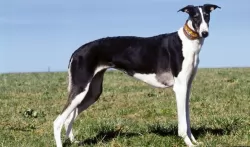 The Chart Polski dog is a member of the Greyhound family and comes from Poland. He is an old dog breed dating way back to the 1600s.
The Chart Polski dog is a member of the Greyhound family and comes from Poland. He is an old dog breed dating way back to the 1600s.
The dog also goes by other names such as the Polish Sighthound and the Polish Greyhound. The dog looks quite similar to the English Greyhound and has been used as a hunting dog. With his exceptional speed, he has been able to run down prey.
The Chart Polski has always been seen in privileged classes, and after dying out to some extent, it became popular again in the 1970s. It is looked upon as a companion dog essentially while also still being used for hunting in Poland.
Today, the Polish Kennel Club as well as the Federation Cynologique Internationale, and the United Kennel Club recognize the breed.
 The Dunker is a medium sized dog which stands at between 50-55cms with females being slightly smaller at 47-52cms. They usually weigh between 11-18kg and look similar to other scenthounds, being muscular and athletic.
The Dunker is a medium sized dog which stands at between 50-55cms with females being slightly smaller at 47-52cms. They usually weigh between 11-18kg and look similar to other scenthounds, being muscular and athletic.
The ears of the Dunker are floppy, the tail is long and carried straight with a bit of a curve, the nose is large and black as well as the eyes, but some dogs have light eyes which can even be blue.
The coat of the Dunker is straight and dense and this coat of his is well known for the unique color of the coat – blue or black dappled, while some dogs will have black, tan and white markings. White faces are preferred but you will find dogs with black masks.
This is a non-aggressive dog and can become quite friendly when trained and socialized.
They are dogs that form strong bonds with their owners, being particularly good around children. They get on well with dogs and other pets in the home.
They’re intelligent dogs and are are easy to train. In fact, training and socialization is recommended for this dog as he does tend to be a bit stubborn.
Training ensures he is relaxed and obedient. He is an active dog and will certainly require some exercise each day. He’ll respond willingly if you call him to join you in your jogging- or cycling outings.
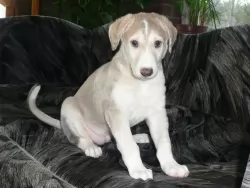 The Chart Polski looks similar to other sighthound breeds, and is a large breed, standing at between 68-80cm and weighing between 26 and 32kg. He is well muscled, slender and lean.
The Chart Polski looks similar to other sighthound breeds, and is a large breed, standing at between 68-80cm and weighing between 26 and 32kg. He is well muscled, slender and lean.
The face is typically long and narrow, although the muzzle is somewhat blunter than most sighthounds. His coat is short and sleek and can be in colors such as white, tan, black or a combination of these. His eyes are large and dark brown, the ears medium sized and narrow and usually folded back while the tail is long and curved at the tip.
The Chart Polski’s temperament is somewhat different to most sighthounds and he is thought to be more gentler and evenly tempered. He is loving and affectionate and will form a close bone with his human family.
He is confident, stubborn and strong-willed, and because he has been used for hunting, he has also got some aggressive tendencies towards other animals. He will need training and socialization to ensure he is good around other pets in the home as well as with children.
He becomes obedient and responsive with this training and socialization. He is a territorial breed, being protective around what he considers his own property and will make a good watchdog.
 The Dunker is such a good tempered dog and he will be happy to settle in the city or the countryside with his owner.
The Dunker is such a good tempered dog and he will be happy to settle in the city or the countryside with his owner.
When you look at his history, he is a hunting dog, used for hunting rabbits. Being an active breed, he is better suited to living in a home where there is at least a fair sized garden.
He isn’t a high maintenance dog either, so no special attention to grooming is required. Being a fairly healthy breed, he isn’t likely to develop any serious health issues too. This low-maintenance, undemanding Norwegian Hound makes a splendid pet.
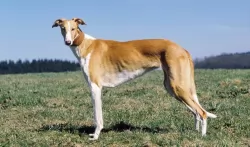 Your Chart Polski or Polish Greyhound promises to be a loving, devoted pet that fits in well to a family that will give him good exercise and look after him well.
Your Chart Polski or Polish Greyhound promises to be a loving, devoted pet that fits in well to a family that will give him good exercise and look after him well.
He isn’t as gentle as other hounds and can therefore make a good watchdog too. He is territorial and wants to protect all those he regards as his own.
Train him and socialize him, and you will see that this intelligent, independent and self-confident dog can become obedient and also relaxed around people as well as other pets in the home, making him a splendid pet for those who admire these tall, slender dogs.
 The Dunker dog can live to reach a ripe age of 12 to 15 years. There are some health issues he may face -
The Dunker dog can live to reach a ripe age of 12 to 15 years. There are some health issues he may face -
Partial or complete hearing loss can come about because of dirt or wax build-up in the ear canals. It can be because of an untreated ear infection, an injury or even old age.
Your veterinarian can examine your dog’s ear canal. Certain dog breeds such as the Dunker and others are more predisposed to deafness and you’ll find your dog responding slowly to your voice or he may be totally startled when woken.
Your vet will determine the type of treatment for your dog if an ear infection for instance is suspected. Treatment in this case may involve cleaning wax out of the ears or getting rid of overgrown ear hair.
Hip dysplasia is an inherited condition with your dog where bone rubs against other bone. Your Dunker dog will be in pain and his movement could be limited and he may even become lame. Get your pet to the vet because there are a number of treatment options.
Take a look at your pet’s eyes so that you’re aware of cloudiness, inflammation, discharge, a change in eye color or red eyelid lining. Take him to the vet if you suspect something serious, but in the meantime you can also gently wipe over your pet’s eyes to remove any discharge.
If you do need to bath your pet, make sure to protect his eyes before applying any lotion.
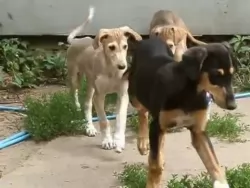 The Chart Polski can live to be 10 – 12 years when he gets his full quota of care in terms of good diet, exercise, love and care and a nice dry, warm place to sleep.
The Chart Polski can live to be 10 – 12 years when he gets his full quota of care in terms of good diet, exercise, love and care and a nice dry, warm place to sleep.
He isn’t known to have any specific health issues that could shorten his life, but by knowing about some of the common dog ailments there are, you can watch your pet and even prevent some risks.
People often think that bad teeth can’t do much harm, but tartar build-up can progress to gum disease, to the roots of the teeth and to damaging other parts of the body such as kidney-, liver- and heart.
Bacterial and viral infections are a threat to any dog, and rabies and parvo for instance can take your pet’s life. Remember that terrible diseases such as these can be prevented through having your dog vaccinated.
Dogs are open to getting all kinds of parasites inside- as well as outside on the skin. Hookworm, roundworm, fleas and ticks are examples of these parasites that can get into your pet’s system through dirty food,water and bites from mosquitoes. Some of these parasites can even be transmitted to you.
If your pet is in any way run down, get him to a vet immediately as there is an effective treatment.
 The Dunker is a dog with stamina and energy and he will need a walk every day as well as some other forms of vigorous exercise. The idea is to involve a dog like this in all your activities, whether you go running, swimming or cycling.
The Dunker is a dog with stamina and energy and he will need a walk every day as well as some other forms of vigorous exercise. The idea is to involve a dog like this in all your activities, whether you go running, swimming or cycling.
The Dunker isn’t going to require you to spend a lot of money on maintenance for him. A good brush-down twice a week will be adequate as he is a fairly heavy shedder and brushing him will get rid of all those loose hairs. It is also time to check him over for fleas and ticks too.
Other grooming aspects to check will include nail trimming, checking the inside of the dog’s ears for excess wax build-up and dirt.
Dental care is of major concern because teeth left unattended can result in mouth bacteria. This bacteria enters the blood stream and results in systemic infection. Sometimes the bad teeth can be so painful that a dog no longer wants to eat.
It is imperative to brush your pet’s teeth at least 2 or 3 times a week with a special dog toothbrush and toothpaste.
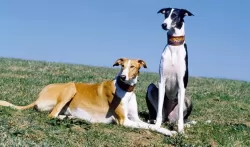 The Chart Polski was bred as a hunting dog and to run at top speed to bring down its prey. Today, he is tall and lean and still loves to run, and will therefore require a good deal of exercise.
The Chart Polski was bred as a hunting dog and to run at top speed to bring down its prey. Today, he is tall and lean and still loves to run, and will therefore require a good deal of exercise.
Don’t let his slender build deceive you because he is powerful and will need a walk every day and be given the opportunity to run. He will happily accompany you when you go running or cycling. Left un-exercised, he will become frustrated and aggressive and even destructive, so as a responsible dog owner, it is up to you to ensure he is well exercised.
The Chart Polski is a large breed puppy and they tend to grow fast at first. You want to make sure that he doesn’t put on weight too quickly as this puts them at risk for skeletal development problems later on such as hip- and elbow dysplasia. Speak to your veterinarian about feeding your puppy correctly so that he grows slowly, allowing his bones and joints to develop strongly and healthily.
Your adult Chart Polski will also need a special diet that caters for his size and energy levels. Remember to include some raw meat into his diet occasionally as well, as this will help him steer clear of dry, allergic skin conditions. Always ensure that he has access to fresh, cool water.
As a hunting dog, you’ll find the Chart Polski to require little grooming. No trimming or stripping is required for his short coat and you’ll simply need to brush him down twice a week.